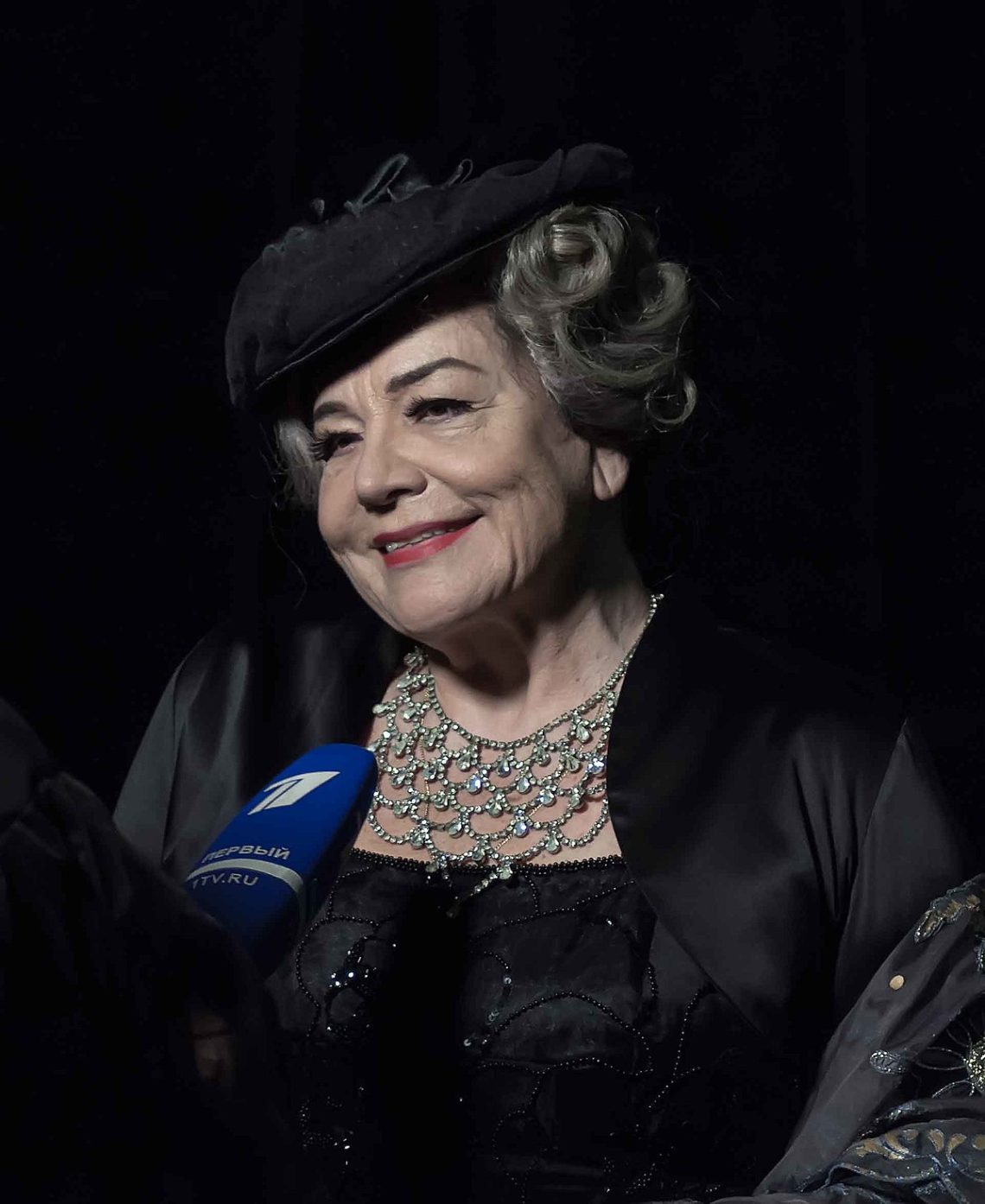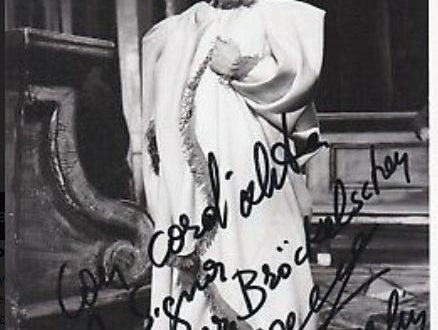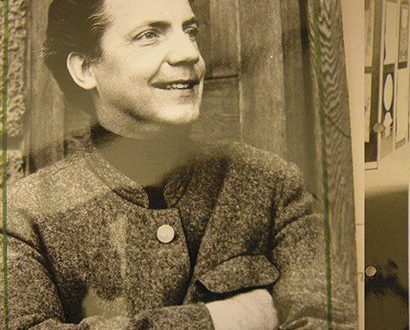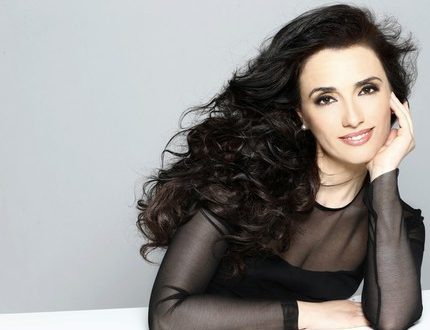
Irina Petrovna Bogacheva |
Irina Bogacheva
She was born on March 2, 1939 in Leningrad. Father – Komyakov Petr Georgievich (1900-1947), professor, doctor of technical sciences, head of the department of ferrous metallurgy at the Polytechnic Institute. Mother – Komyakova Tatyana Yakovlevna (1917-1956). Husband – Gaudasinsky Stanislav Leonovich (born in 1937), a prominent theatrical figure, People’s Artist of Russia, head of the Department of Music Directing at the St. Petersburg Conservatory. Daughter – Gaudasinskaya Elena Stanislavovna (born in 1967), pianist, winner of the International and All-Russian competitions. Granddaughter – Irina.
Irina Bogacheva inherited the traditions of high spirituality of the Russian intelligentsia from the older members of her family. Her father, a man of great culture, who spoke four languages, was keenly interested in art, especially theater. He wanted Irina to receive a liberal arts education, and from childhood he tried to get her to like languages. Mother, according to Irina’s memoirs, had a lovely voice, but the girl inherited a passionate love for singing not from her, but, as her relatives believed, from her paternal grandfather, who babbled on the Volga and had a powerful bass.
Irina Bogacheva’s early childhood was spent in Leningrad. Together with her family, she fully felt the hardships of the blockade of her native city. After her removal, the family was evacuated to the Kostroma region and returned to their hometown only by the time Irina entered school. As a seventh-grader, Irina first came to the Mariinsky – then the Kirov Opera and Ballet Theatre, and he became her love for life. Until now, the impressions of the first “Eugene Onegin”, the first “Queen of Spades” with the unforgettable Sophia Petrovna Preobrazhenskaya in the role of the Countess have not been erased from memory …
The vague hopes of becoming a singer that had dawned, however, faced difficult life circumstances. Suddenly, his father dies, whose health was undermined by the blockade, a few years later his mother follows him. Irina remained the eldest among the three sisters, whom she now had to take care of, earning a living herself. She goes to technical school. But the love of music takes its toll, she participates in amateur performances, attends circles of solo singing and artistic expression. The vocal teacher, Margarita Tikhonovna Fitingof, who once performed on the stage of the Mariinsky Theater, having appreciated the unique abilities of her student, insisted that Irina take up singing professionally, and she herself brought her to the Leningrad Rimsky-Korsakov Conservatory. At the entrance exam, Bogacheva sang Delilah’s aria from Saint-Saens’ opera Samson and Delilah and was accepted. From now on, her whole creative life is connected with the conservatory, the first higher musical educational institution in Russia, as well as with the building on the other side of the Theater Square – the legendary Mariinsky.
Irina became a student of I.P. Timonova-Levando. “I am very grateful to fate that I ended up in the class of Iraida Pavlovna,” says Bogacheva. – A thoughtful and intelligent teacher, a sympathetic person, she replaced my mother. We are still connected by deep human and creative communication.” Subsequently, Irina Petrovna trained in Italy. But the Russian vocal school, learned by her in the conservatory class of Timonova-Levando, turned out to be the basis of her singing art. While still a student, in 1962, Bogacheva became a laureate of the All-Union Glinka Vocal Competition. Irina’s great success aroused increased interest in her from theaters and concert organizations, and soon she received proposals for a debut simultaneously from the Moscow Bolshoi Theater and the Leningrad Kirov Theater. She chooses the great theater on the banks of the Neva. Her first performance here took place on March 26, 1964 as Polina in The Queen of Spades.
Soon world fame comes to Bogacheva. In 1967, she was sent to the prestigious international vocal competition in Rio de Janeiro, where she received the first prize. Brazilian critics and observers from other countries called her victory sensational, and the reviewer of the newspaper O Globo wrote: were fully manifested in the final round, in her magnificent performance of Donizetti and Russian authors – Mussorgsky and Tchaikovsky. Along with the opera, the singer’s concert activity is also successfully developed. It is not easy to imagine how much work, what concentration and dedication such a rapidly developing career required from a young artist. From her youth, she is highly characterized by a sense of responsibility for the cause she serves, for her reputation, pride in what she has achieved, a good, stimulating desire to be the first in everything. To the uninitiated, it seems that everything turns out by itself. And only fellow professionals can feel how much truly selfless work is required in order for the huge variety of styles, images, types of musical drama that Bogacheva owns to be demonstrated at the level of such high artistry.
Arriving in 1968 for an internship in Italy, with the famous Genarro Barra, she managed to study under his guidance such a number of operas that other scholarship holders could not pass: Bizet’s Carmen and Verdi’s creations – Aida, Il trovatore, Louise Miller ”, “Don Carlos”, “Masquerade Ball”. She was the first among domestic interns to receive an offer to perform on the stage of the famous La Scala theater and sang Ulrika, earning enthusiastic approval from the public and critics. Subsequently, Bogacheva performed in Italy more than once and was always very warmly received there.
The routes of numerous further tours of the outstanding artist included the entire globe, but the main events of her artistic life, the preparation of the most important roles, the most significant premieres – all this is connected with her native St. Petersburg, with the Mariinsky Theater. Here she created a gallery of female portraits, which became the property of the treasury of Russian opera art.
Marfa in Khovanshchina is one of her most significant stage creations. The pinnacle of the actress’s interpretation of this role is the last act, the amazing scene of the “love funeral”. And the ecstatic march, where Bogacheva’s trumpet tops sparkle, and the love melody, where unearthly tenderness flows into detachment, and singing can be likened to a cello cantilena – all this remains in the listener’s soul for a long time, evoking a secret hope: the earth that gives birth to such an embodiment of beauty will not perish and strength.
Rimsky-Korsakov’s opera “The Tsar’s Bride” is now perceived as a creation that vividly resonates with our days, when violence can only give rise to violence. Anger, trampled pride, Lyubasha-Bogacheva’s contempt for Grigory and herself, changing, give rise to a spiritual storm, each stage of which is conveyed by Bogacheva with extraordinary psychological insight and acting skills. Exhausted, she begins the aria “This is what I have lived up to,” and the fearless, cold, otherworldly sound of her voice, the mechanically even rhythm make her cringe: there is no future for the heroine, here is a premonition of death. The stormy end of the role in the final act in the interpretation of Bogacheva is like a volcanic eruption.
Among the most beloved and famous roles of Bogacheva is the Countess from The Queen of Spades. Irina Petrovna participated in many productions of the brilliant opera, in her native city and abroad. She developed her interpretation of the character of Pushkin and Tchaikovsky in collaboration with directors Roman Tikhomirov, Stanislav Gaudasinsky (in his performance, performed at the Mussorgsky Theater, she performed on tour of the group in Europe, America, Asia), conductors Yuri Simonov, Myung-Wun Chung . She was invited to the international cast that presented The Queen of Spades in Paris, at the Opera de la Bastille, in Andron Konchalovsky’s sensational reading. In the spring of 1999, she performed the role of the Countess (as well as the Governess) at the Metropolitan Opera in New York, in a historical performance directed by Valery Gergiev and directed by Elijah Moshinsky, where the great Plácido Domingo performed for the first time as Herman. But perhaps the most productive was the scrupulous study of the part of the Countess with Yuri Temirkanov, who, in the famous production of the Kirov Theater, supervised both the musical and stage aspects.
Among the many roles in operas by foreign composers, two roles should be singled out especially as her highest artistic accomplishments – Carmen and Amneris. How dissimilar are the impudent girl from the tobacco factory in Seville and the haughty daughter of the Egyptian pharaoh! And yet, with each other and with other heroines of Bogacheva, they are connected by a common idea, through all her work: freedom is the main human right, no one can, should not take it away.
The majestic and beautiful Amneris, the all-powerful daughter of the king, is not given to know the bliss of shared love. Pride, love and jealousy, which prompts the princess to be cunning and explode with anger, everything is bizarrely combined in her, and Bogacheva finds vocal and stage colors to convey each of these states with maximum emotional intensity. The way Bogacheva conducts the famous scene of the trial, the sound of her roaring lower notes and piercing, powerful high ones, will never be forgotten by everyone who happened to see and hear it.
“The part that is dearest to me is undoubtedly Carmen, but it was she who became for me a constant test of maturity and skill,” admits Irina Bogacheva. It seems that the artist was born to appear on stage as an uncompromising and ardent Spaniard. “Carmen must have such charm,” she believes, “so that the viewer relentlessly follows her throughout the performance, as if from her light, bewitching, alluring, should emanate.”
Among the most significant roles of Bogacheva, Azucena from Il trovatore, Preziosilla from Verdi’s The Force of Destiny, Marina Mnishek from Boris Godunov, and Konchakovna from Prince Igor should be ranked. Among the best roles of modern authors is the laundress Marta Skavronskaya, the future Empress Catherine, in Andrey Petrov’s opera Peter the Great.
Performing capital roles, Irina Petrovna never looked down on small roles, being sure that there are none: the significance, originality of a character is not at all determined by the length of his stay on stage. In the play “War and Peace” by Yuri Temirkanov and Boris Pokrovsky, she superbly played the role of Helen Bezukhova. In the next production of Sergei Prokofiev’s opera by Valery Gergiev and Graham Wikk, Bogacheva performed the role of Akhrosimova. In another Prokofiev opera – The Gambler after Dostoevsky – the artist created the image of Granny.
In addition to performances on the opera stage, Irina Bogacheva leads an active concert activity. She sings a lot with an orchestra and piano accompaniment. In her concert repertoire she includes arias from classical operettas and songs, including pop songs. With inspiration and feeling she sings “Autumn” and other wonderful songs by Valery Gavrilin, who highly appreciated her artistic gift…
A special chapter in the history of Bogacheva’s chamber music-making is associated with her work on vocal compositions by D. D. Shostakovich. Having created the Suite to the verses of Marina Tsvetaeva, he listened to many singers, choosing who to entrust the first performance to. And stopped at Bogacheva. Irina Petrovna, together with S. B. Vakman, who performed the piano part, treated the preparations for the premiere with extraordinary responsibility. She penetrated deeply into the figurative world, which was new to her, significantly expanding her musical horizons, and experienced a feeling of rare satisfaction from this. “Communication with her brought me great creative joy. I could only dream of such a performance, ”said the author. The premiere was enthusiastically received, and then the artist sang the Suite many more times, in all parts of the world. Inspired by this, the great composer created a version of the Suite for voice and chamber orchestra, and in this version Bogacheva also performed it more than once. Exceptional success accompanied her appeal to another vocal work by a brilliant master – “Five satires on the verses of Sasha Cherny.”
Irina Bogacheva works a lot and fruitfully at the Lentelefilm studio and on television. She starred in musical films: “Irina Bogacheva Sings” (director V. Okuntsov), “Voice and Organ” (director V. Okuntsov), “My Life Opera” (director V. Okuntsov), “Carmen – Pages of the Score” (director O. Ryabokon). On St. Petersburg television, video films “Song, Romance, Waltz”, “Italian Dreams” (director I. Taimanova), “Russian Romance” (director I. Taimanova), as well as the singer’s anniversary benefit performances in the Great Philharmonic Hall (by the 50 , 55th and 60th birthdays). Irina Bogacheva recorded and released 5 CDs.
Currently, the singer’s creative life is extremely saturated. She is the Deputy Chairman of the Coordinating Council of Creative Unions of St. Petersburg. Back in 1980, while at the peak of her singing career, the singer took up pedagogy and has been teaching solo singing at the St. Petersburg Conservatory as a professor for twenty years. Among her students are Olga Borodina, who is considered one of the best opera singers in the world, Natalya Evstafieva (diploma winner of the International Competition) and Natalya Biryukova (winner of the International and All-Russian Competitions), who had great success in Germany and were nominated for the Golden Soffit Award, Yuri Ivshin (soloist of the Mussorgsky Theater, laureate of international competitions), as well as young soloists of the Mariinsky Theater Elena Chebotareva, Olga Savova and others. Irina Bogacheva – People’s Artist of the USSR (1976), People’s Artist of the RSFSR (1974), Honored Artist of Russia (1970), laureate of the State Prize of the USSR (1984) and the State Prize of the RSFSR named after M. Glinka (1974). In 1983, the singer was awarded a Certificate of Honor from the Presidium of the Supreme Soviet of the RSFSR, and on May 24, 2000, the Legislative Assembly of St. Petersburg awarded Irina Bogacheva the title of “Honorary Citizen of St. Petersburg”. She was awarded the Order of Friendship of Peoples (1981) and “For Merit to the Fatherland” III degree (2000).
The intensive and multifaceted creative activity that Irina Petrovna Bogacheva is engaged in requires the application of colossal forces. These forces give her a fanatical love for art, music, opera. She has a high sense of duty for the talent given by Providence. Driven by this feeling, from a young age she got used to working hard, purposefully and methodically, and the habit of work helps her a lot.
Support for Bogacheva is her house in the suburbs of St. Petersburg, spacious and beautiful, furnished to her taste. Irina Petrovna loves the sea, forest, dogs. He likes to spend his free time with his granddaughter. Every summer, if there is no tour, he tries to visit the Black Sea with his family.
PS Irina Bogacheva died on September 19, 2019 in St. Petersburg.





